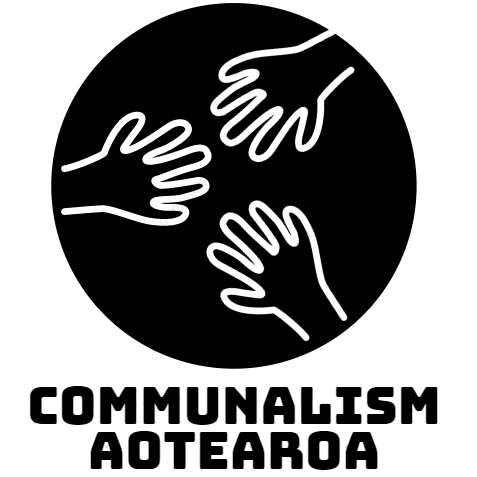This land was liberated from Bashar Al-Assad and Isis. Now we need help to keep it alive.

“Thirty years ago this region was filled with trees,” Adin says, pointing in a dusty swathe of harvested wheat fields spreading to the horizon and the Turkish boundary beyond. “Then the regime sent men to cut down them.”
We’re in the autonomous region of northern Syria called Rojava, standing atop a hill planted with young saplings. To untrained eyes the landscape looks impossibly arid. However, Adin, a Kurdish friend who works in a fledgling tree nursery in neighboring Derik, recalls when it was still living and green.
Our aim, as members of the Internationalist Commune of Rojava, is to create this property green once more.
Widespread deforestation is only one tool used by successive generations of the Assad dynasty to repress the Kurdish folks who make up the vast majority of Rojava’s inhabitants.
The Kurdish language was banned, Kurds were stripped of identity cards to become literal second-class taxpayers and Kurdish activists were murdered and tortured. In 2004, as an instance, dozens of Kurds were slaughtered after demonstrations in the majority-Kurdish town of Qamishlo.
Ethnic repression helped the regime keep Rojava as an internal colony, extracting wealth while maintaining the people dependent by monopolising oil and wheat monocultures. Oil derricks dip and grow all along the Rojava skyline, but there isn’t any refinery here.
Likewise, the central authorities enforced overproduction of wheat, using Rojava’s areas to maintain Damascene grain shops overflowing. This unnatural state of affairs was enforced by means of a ban on growing trees and crops other than wheat. Overuse of damaging fertilisers maintained the land living on life support, forever on the verge of famine.
In 2011, a power vacuum started as the regime became embroiled in civil war. The Kurdish people, who attracted global support after their defeat of Isis in Kobane, managed to set up autonomous self-rule.
Following the ideas of the imprisoned representative of the Kurdish people Abdullah Ocalan, they established a “democratic-confederalist” political system based on neighbourhood councils called “communes” and the principles of gender liberation, grassroots democracy and ecology.
Ordinary individuals decide on most political issues through this commune system. Girls take the leading role, organising autonomously in most areas of the self-administration and occupying a guaranteed 50 percent of leadership roles.
The commune is one of thousands, encompassing the vast majority of Rojavan villages and neighbourhoods. However, our commune is also exceptional, offering a location for internationalists from throughout the planet to learn in the revolution and contribute to the battle for a feminist and ecological society.

Across the past five decades, much vital work has already started to decrease overreliance on pesticides, wheat and water-intensive plants. New wells are banned and new environmental communes and nature reserves opened, while a more varied harvest is planted every year.
But changing the area’s ecology is a enormous undertaking, particularly under conditions of war. We only need look at the barren areas surrounding us to see just how close we still are to drought.
This past year, members of the commune started to research about how we can contribute to the continuing struggle. Studying the theories of Murray Bookchin, Silvia Federici and Abdullah Ocalan, we came to understand ecological crises as a result of oppressive power structures.
Speaking with local people and environmental committees, we learned how Turkey limits the flow of rivers to maintain Rojava at permanent risk of drought, how Isis destroyed water sources and put damaging oil fires to conceal their movements as they fled before the Kurdish resistance, the years of war have left the area ravaged with heavy metals out of munitions and other toxic waste.
That is why we’re setting a tree nursery, helping to restore fertility and stability to the property. The planting of trees symbolises our will to contribute to the building of an ecological society, going beyond the life span of the person to contribute to future generations.
However, the tens of thousands of trees we are planting together with the local population are only the first job of our Make Rojava Green Again campaign.
Here in the commune, we are developing sustainable projects including a standalone wind turbine and a method to recycle soiled water to agricultural use. These pilot projects will be replicated throughout the region.

We also welcome assistance from global ecological and energy specialists — either seeing us in the commune or sharing their own knowledge from afar.
Needless to say, not everyone is able to travel to Syria. So we are crowdfunding to publish a novel about our study, struggles and experiences here.
This publication is a seed, step one helping us to connect with environmental struggles throughout the planet and work together through the shared beliefs of this Rojava revolution.
At exactly the exact same time, many forces are trying hard to obliterate those ideals. Earlier this year, our friend Anna Campbell laid down her life in Afrin resisting a barbarous Turkish attack on Rojava’s feminist, environmental and democratic principles.
Anna shared at the first meal we ate together in the commune and our academy conveys her Kurdish title — Helin Qerecox. While the Turkish airstrikes that took Anna’s life rained down in Afrin, armed jihadi forces were torching the area’s iconic olive groves.
Due to the sacrifices of heroes such as Anna, this ground was free after centuries of oppression and war. We see it as our obligation to keep it alive for generations yet to come.
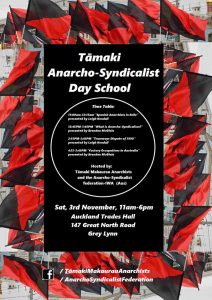 Wow – this doesn’t happen very often! A comrade from the Anarcho-Syndicalist Federation in Australia is visiting Aotearoa and doing a speaking tour with five public meetings across the country. Very exciting! Here are all the details:
Wow – this doesn’t happen very often! A comrade from the Anarcho-Syndicalist Federation in Australia is visiting Aotearoa and doing a speaking tour with five public meetings across the country. Very exciting! Here are all the details:
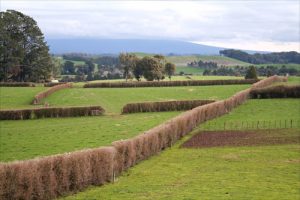 Boxthorn. Introduced to Aotearoa / New Zealand from South Africa some time in the early 1870s and not long after was brought to Taranaki where it was used for hedges on sheep and dairy farms. In Africa, it was used to keep lions out of villages. In Taranaki, the hedges prevent sheep and cattle from escaping and provide at least some shelter from the prevailing winds.
Boxthorn. Introduced to Aotearoa / New Zealand from South Africa some time in the early 1870s and not long after was brought to Taranaki where it was used for hedges on sheep and dairy farms. In Africa, it was used to keep lions out of villages. In Taranaki, the hedges prevent sheep and cattle from escaping and provide at least some shelter from the prevailing winds. 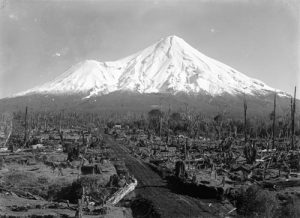
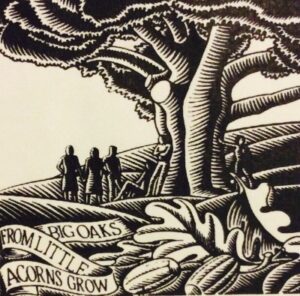




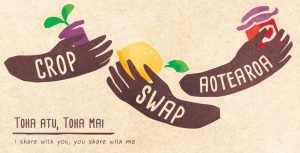
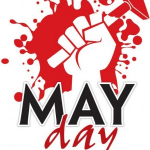 The origins of May Day are still well known for those of us on the revolutionary Left. For a brief refresher:
The origins of May Day are still well known for those of us on the revolutionary Left. For a brief refresher: 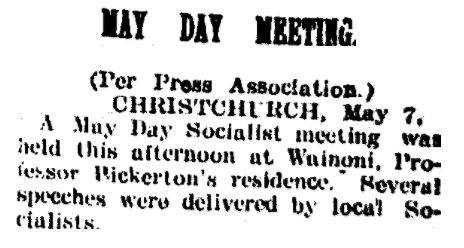
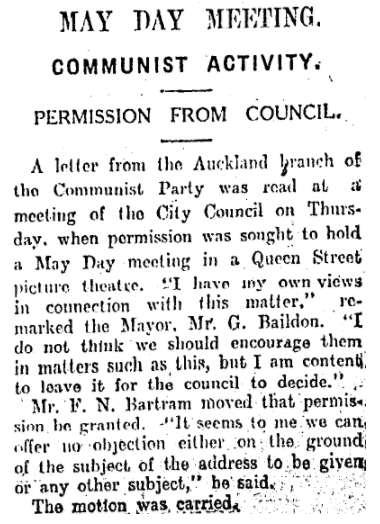
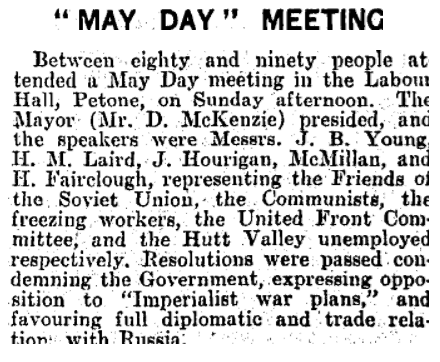
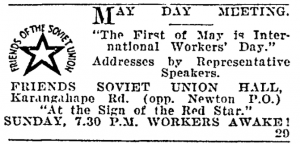
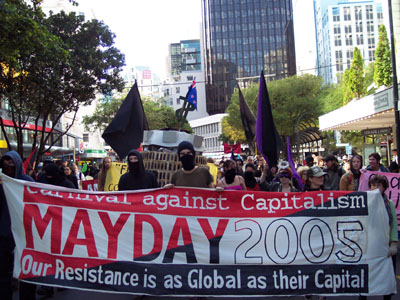 Wellington 2005
Wellington 2005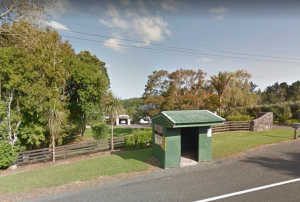
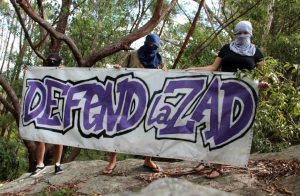 By Beverly Naidus – repost from the
By Beverly Naidus – repost from the 